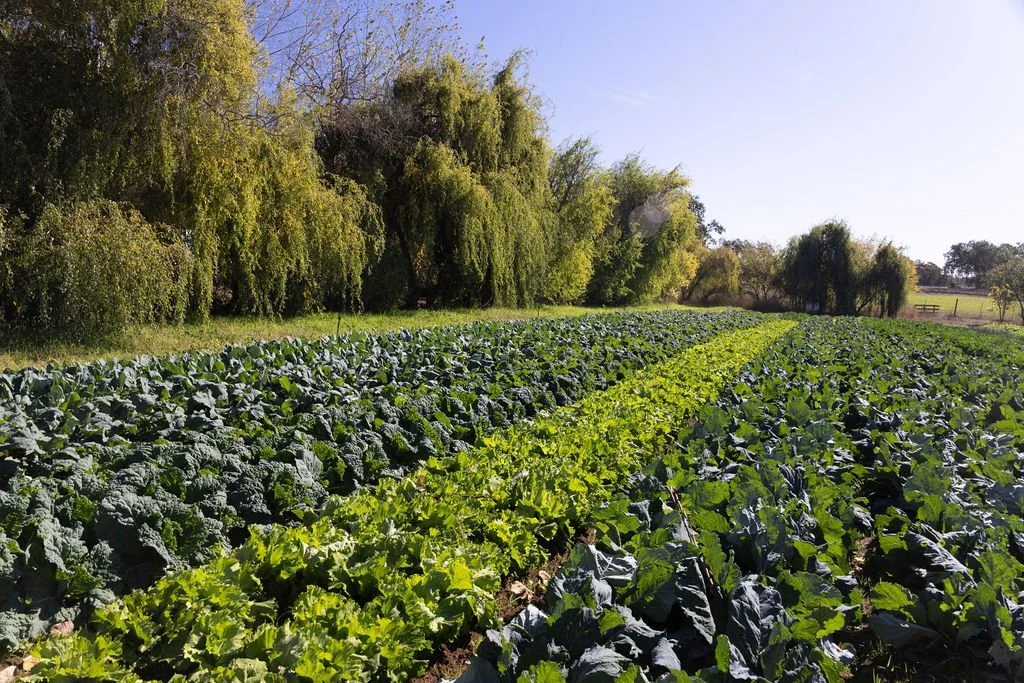The USDA Canceled Our Climate-Smart Agriculture Coalition
What our producers lost, and how AIM intends to continue advancing agricultural practices that reduce greenhouse gas emissions.
Mature hedgerows protecting soil and row crops while supporting wildlife at Longer Table Farm in Santa Rosa.
Find Longer Table Farm at both the Thursday and Sunday Marin markets.
For the last year and a half, AIM has been working in partnership with 11 organizations to aid our North Bay producers in implementing regenerative agriculture. Known as the Sonoma-Marin Agriculture and County Climate Coalition (SMACCC), this federal grant fell under the Partnerships for Climate-Smart Commodities. The USDA awarded $10 million to our coalition, led by the County of Sonoma. Grant partners would assist producers in implementing climate-smart practices to heal our soil, capture carbon, and produce beautiful food and wool fibers.
On Monday, April 14, the USDA terminated the Partnerships for Climate-Smart Commodities grants. In total, $3.1 billion meant to go towards regenerative food and agriculture initiatives has been lost.
What Was the SMACCC Project?
Our project covered a huge array of agricultural products—row crops, dairy, ranches, wine grapes, and more. Federal funding provided conservation project payments to producers for implementing climate-smart practices. SMACCC soil and conservation partners also provided invaluable technical assistance directly to producers.
Our technical team was responsible for measurement, monitoring, verification, and reporting of greenhouse gas benefits (reduction or capture). The also ensured all sites were following agreed upon standards. SMACCC had big climate goals. The climate benefits of this project are estimated to be 253,613 metric tons of carbon dioxide equivalent over 20 years. This is equivalent to the energy use of 33,074 homes for one year.
AIM’s role was to build a robust campaign to educate consumers and buyers about climate-smart agriculture. Growing our mission to remind consumers that our food comes from the earth, to root our audience deeply within the work our producers do. This included a documentary-style video campaign highlighting the joy and hard work of tending to our earth.
What’s Next For AIM’s Climate Work.
This work is deeply necessary for our future. Our intention was to serve as a model that could scale out regionally, and then nationally. But our work was abruptly put to an end. We are losing over a year of resources put into creating this complex and multi-pronged strategy that cannot be fully executed.
The impact is compounding as the current administration continues to pull funding and sign executive orders that devalue our small farms and climate work. The immediate impact stings, but the long-term effects of ignoring climate change will be irreparable. Our agricultural community feels it, our earth feels it.
This project as it was created no longer exists. However, we have an opportunity to reapply to the new administration’s revamped program called Advancing Markets for Producers (AMP). It is unclear what realignment would look like for our goals as an organization, a coalition, and agricultural community.
Regardless of the decisions currently being made by the federal government, AIM stands by its mission. We will continue to educate and connect our communities to create an Earth-friendly food and agricultural system that shortens the distance from farm to table. Every farmers market attended, small food producer patronized, and locally grown vegetable served with your dinner is a step towards change.
How To Do More.
Call your local representatives - Let them know that food and agriculture policies matter to you. Here is a how to if you need guidance.
Shop local - Shop certified farmers markets to support producers close to home. This reduces packing and shipping costs, along with food waste and more. Plus, $.98 of every dollar spent goes directly into the farmer’s pocket.
Talk to your farmer - Not every farmer grows using the same practices, and that’s ok! Much of the ethos of regenerative farming focuses on the context of each farm, not dogmatic rules and regulations. If you would like to know more about what they grow and how they grow it, they’re very likely happy to answer. Not sure how to start? Simply ask them what they’re excited about right now and see where the conversation goes.
Volunteer - AIM has many ways you can volunteer to help support our mission.
Support the Center for Food & Agriculture - AIM’s Center for Food and Agriculture will be a permanent farmers market, but also a hub for small business support and food policy. Contributing to our campaign helps us advance our fight for better food, a cleaner climate, and economic justice as a part of renewed food systems.
Learn more about the Marin Carbon Project (MCP) – AIM participates on the Steering Committee of the MCP. They are a pioneering collaboration of farmers, ranchers, scientists, and conservation organizations. Their focus is advancing agricultural practices that reduce greenhouse gas emissions, store carbon in soils, and build resilience to climate change in the region.



